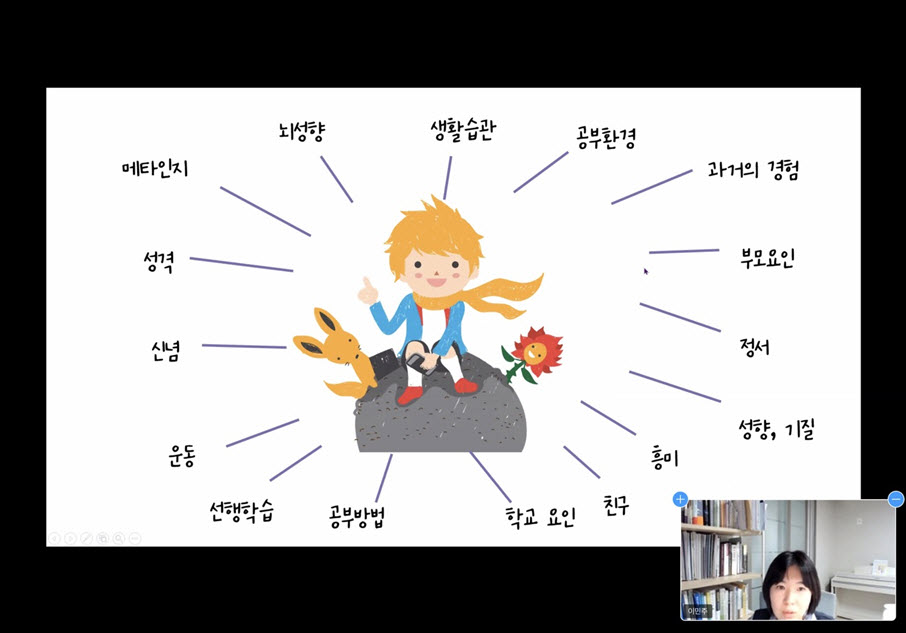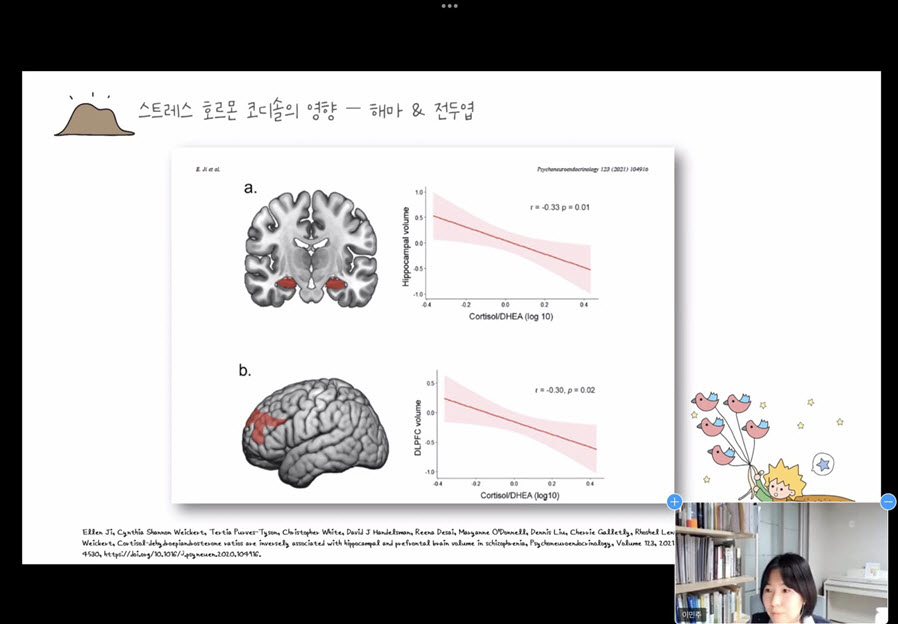Seoul National University students face various learning obstacles to their academic progress such as an intense workload, comparison with peers, and changes in the study environment and learning methods from those in their high school days. In an effort to enhance students’ learning potential, the SNU Faculty of Liberal Education hosts learning clinics twice a year for those experiencing academic difficulties with the objective of identifying the source of such difficulties and sharing effective ways of studying.
The Brain’s Inclination Towards Comfort
The learning clinic workshop is held once during each of the summer and winter sessions. It helps students identify hindrances to learning, enhance academic motivation through exploring personal strengths, and explore type-specific learning strategies using TCI (Temperament and Character Inventory) tests. On February 6, there was a virtual workshop by Professor Min Joo Lee of Korea University on the neuroscience of learning principles and effective study methods. Although the workshop dealt with personal issues such as grades and learning concerns, there was active communication among the 25 participants in an anonymous chat room.

Professor Lee explains factors that affect academic achievement.
In the workshop that started with participants sharing their academic concerns, Professor Lee listed stress as the biggest obstacle to academic achievement. Neurologically, the main motivation for a particular action are the hormones secreted by the brain after feeling a sense of achievement. The intellectual learning process which involves continuous acquisition of concepts is prone to lethargy and stress, emotions that have a negative effect on learning. Professor Lee commented, "When you learn something, the neurons that receive external stimuli connect with each other, activating memory and enabling various behaviors. Stress, however, reduces the volume of both the hippocampus, which converts short-term memory into long-term memory, and the prefrontal cortex, which controls reasoning and deduction, making the brain unable to function properly and ultimately hindering learning ability."
Effective learning methods, the key to a satisfying life beyond earning grades
Professor Lee presented effective learning methods from a neuroscientific perspective. The most important method of all is the formation of healthy habits. Since the brain consumes more energy when performing deliberate acts, forming habits is essential for achievement. A caveat here is to set habits that are so easy that "you can achieve them just by breathing." Of course, efforts should be made to eliminate factors that disturb concentration and to perform these habits consistently. For example, if a student who has difficulty writing a paper sets the habit of sitting at the desk and turning on the laptop as soon as they wake up, they will be able to repeat it and gradually achieve their goal, even if this may mean writing only one sentence a day. Professor Lee advised that it takes at least 100 days for habits to form, and that starting with easy habits is the key.

Professor Lee emphasized the correlation between brain development and stress and explained that habit formation and exercise are effective learning methods from the perspective of neuroscience.
In addition to habit formation, other effective ways to improve learning achievement include regular exercise, sufficient sleep, limiting the use of electronic devices, and finding a study partner. Exercise brings balance to the brain by restoring parts of the brain that have shrunk due to stress. Professor Lee explained that aerobic exercise before studying and weight training in the evening can aid in creating neurological conditions conducive to learning through stimulating brain activity and helping sleep, respectively. She also advised them to refrain from using cellphones two hours before bedtime, since blue light emitted from screens inhibits the secretion of melatonin, a hormone which induces quality sleep and helps enhance the immune system. Being distracted by phones can lower the brain's concentration, so it is better to put them away while studying. Having a study buddy is also an effective method. When a person sees someone else studying, the brain is inclined to concentrate. The hormones dopamine and oxytocin, which are secreted when encouraging others, reinforce motivation and increase the possibility of achieving goals. Professor Lee emphasized that effective learning ensures rest and ultimately enhances the efficiency of people’s lives and summarized that appropriate rest and psychological stability are important conditions for a satisfying life beyond academic achievement.
During the session, the students actively asked questions on how to apply the advice presented in the lecture to their own lives. Hyunwoo Go (Department of Mathematics Education), who enrolled in the workshop to check his study methods before returning to school, commented, "It was helpful to learn scientific learning principles that apply to everyone regardless of their major or personality." He also expressed his appreciation for the workshop as it helped him not only with his own learning problems but also with his efforts on learning how to teach others.
Source: https://www.snu.ac.kr/snunow/snu_story?md=v&bbsidx=140040
Written by Jaeyong Lee, SNU English Editor, moonn6pence@snu.ac.kr
Reviewed by Professor Travis Smith, Department of Asian Languages and Civilizations, tlsmith@snu.ac.kr

